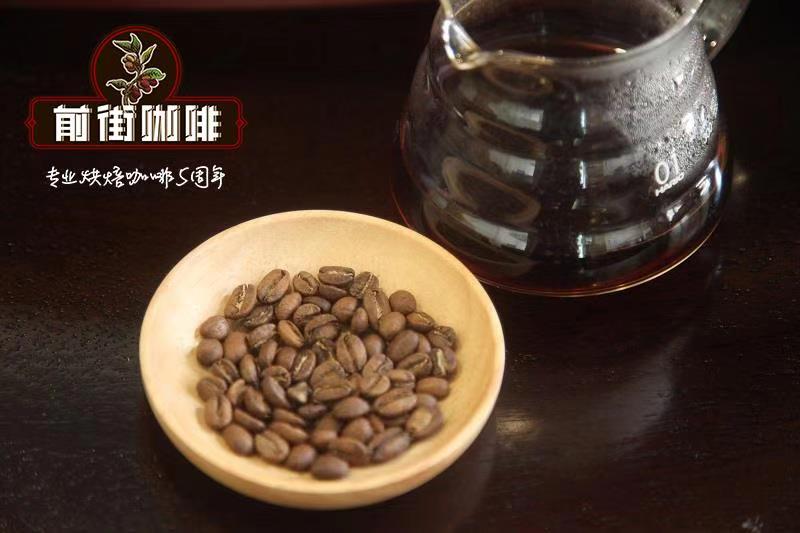A brief introduction to the characteristics of Iron pickup Coffee beans introduction to Pacamara Coffee in Guatemala

Professional coffee knowledge exchange more coffee bean information please follow the coffee workshop (Wechat official account cafe_style)
Front Street Coffee-Arabica Coffee, Pacamara introduction
Arabica, also known as small coffee beans, is native to Ethiopia. Arabica coffee trees mostly grow at an altitude of 1000 ℃ 2000 meters above sea level; they are hardy, and the suitable growth temperature is 15 mures and 24 meters; they need more humidity, and the annual rainfall is not less than 1500 milliliters; at the same time, they also have higher requirements for cultivation techniques. Arabica coffee tree is a large shrub with oval, dark green leaves and oval fruit. Generally, there are two slightly flattened beans with long oval on the front, narrow and curved cracks in the middle, S-shaped, and smooth arc on the back of the beans. Caffeine content is about 0.8% Rue 1.5%.
Arabica coffee began to spread around the world in the mid-1700s. Historically, most coffee is descended from Typica and Bourbon. In the mid-20th century, breeders began to introduce "infiltration" varieties resistant to "coffee leaf rust".
There are dozens of varieties of Arabica coffee widely grown around the world, each with unique performance and adaptation to local conditions. although there are several types of coffee beans, Arabica coffee is considered to have the best quality coffee beans. Today, Arabica coffee is still the most popular coffee bean in the world and accounts for about 70% of the world's coffee production.
Salvadoran coffee
In the early 1990s, guerrilla warfare greatly damaged the country's national economy, reducing coffee production from 3.5 million bags in the early 1970s to 2.5 million bags in 1990-1991. The eastern part of the country was most affected by guerrilla warfare, and many farmers and workers were forced to leave the manor. The shortage of funds has led to a sharp drop in coffee production, from 1200 kg per hectare in the past to less than 900kg per hectare today. In addition, the government imposed an additional 15% tariff on exported coffee in 1986, that is, an additional 15% in addition to the existing 30% tax. Taxes, together with unfavorable exchange rates, have greatly reduced the export of coffee and the quality of coffee.
The government finally realized the great role of coffee in the national economy, such as solving employment, earning foreign exchange and developing agricultural production, so it privatized some coffee export industries in 1990, hoping to increase the income rate of coffee in the export market.
| 01 | Geographic conditions |
There are many volcanoes in El Salvador, known as the "country of volcanoes". The fertile volcanic soil provides an excellent source of nutrients for coffee beans. Coffee trees are planted at an altitude of 1000, Murray, 1200 meters, and the temperature is cool and suitable. It is also an excellent geographical environment for the cultivation of Arabica coffee.
El Salvador, located in the center of Central America, is one of the oldest coffee birthplaces in the world, rich in Bourbon, Pacas and Pacamara coffee varieties. Coffee estates are located in the hills and volcanic slopes with the most fertile soil, mainly concentrated in six producing areas of Alotepec, Apaneca, El B á lsamo, Chichontepec, Tepaca and Cacahuatique, covering an area of 161000 hectares. Due to the special volcanic topography and soil, Salvadoran coffee has a unique flavor, mellow taste, moderate sweet and sour, rich aroma, and charming tonality.
The Pacamara coffee on the front street is from Guatemala.
Pacamara honey treatment
Product name: Pacamara
Treatment method: honey treatment
Origin: Guatemala
Grade: SHG
Bean seed: Pacamara PACAMARA
Poster: 1250 meters
Flavor: the entrance is gentle, clean, sweet orange, sweet aftertaste
END
Important Notice :
前街咖啡 FrontStreet Coffee has moved to new addredd:
FrontStreet Coffee Address: 315,Donghua East Road,GuangZhou
Tel:020 38364473
- Prev

A brief introduction to the characteristics of Yejia Xuefei Coffee normal drinking method of washed coffee
Professional coffee knowledge exchange more coffee bean information please follow the coffee workshop (Wechat official account cafe_style) Qianjie Coffee-Yega Xuefei washing Waka, brewing tasting introduction Yega Xuefei Yirga cheffe originally belonged to the sub-area of Sidamo, it is independent because of its special flavor. Lake Turkana, Lake Abaya and Lake Chamo bring rich water vapor here. To the Fog Valley (M
- Next

How about Guatemalan coffee beans? Guatemalan coffee brand Antigua coffee producing area
Professional coffee knowledge exchange more coffee bean information please follow the coffee workshop (Wechat official account cafe_style) the front street coffee-Antigua production area of Guatemala, Pacamara introduction Guatemala is bordered by Mexico to the north, Honduras and El Salvador to the south, the Caribbean to the east and the Atlantic Ocean to the west. The area is only three times the size of Taiwan Island, but it is blessed by nature to lean on mountains and water and sit on tropical rain forests.
Related
- Beginners will see the "Coffee pull flower" guide!
- What is the difference between ice blog purified milk and ordinary milk coffee?
- Why is the Philippines the largest producer of crops in Liberia?
- For coffee extraction, should the fine powder be retained?
- How does extracted espresso fill pressed powder? How much strength does it take to press the powder?
- How to make jasmine cold extract coffee? Is the jasmine + latte good?
- Will this little toy really make the coffee taste better? How does Lily Drip affect coffee extraction?
- Will the action of slapping the filter cup also affect coffee extraction?
- What's the difference between powder-to-water ratio and powder-to-liquid ratio?
- What is the Ethiopian local species? What does it have to do with Heirloom native species?

